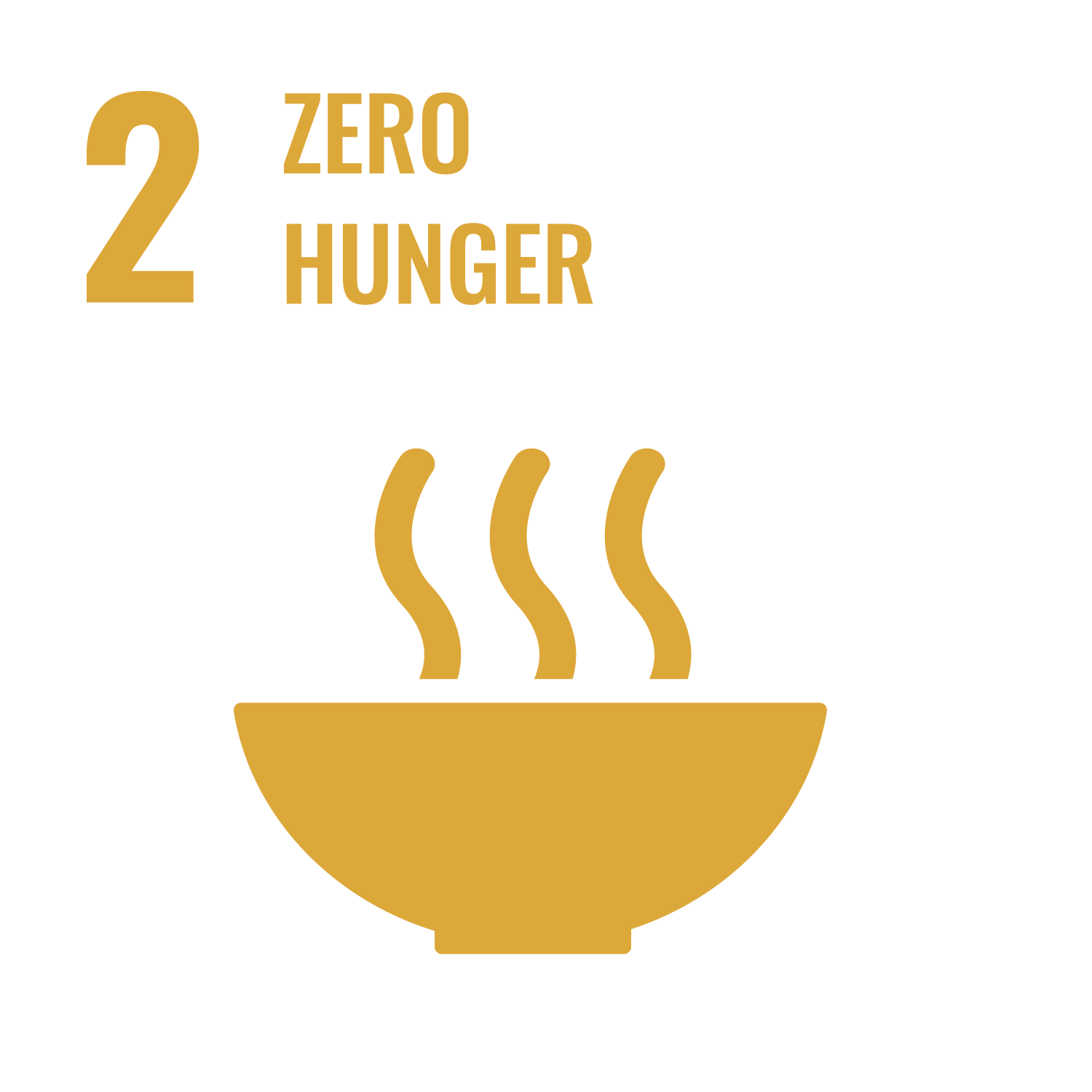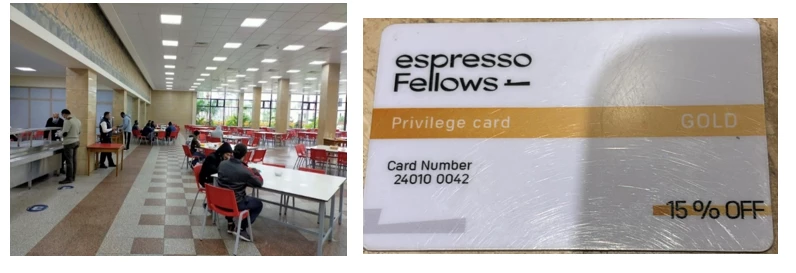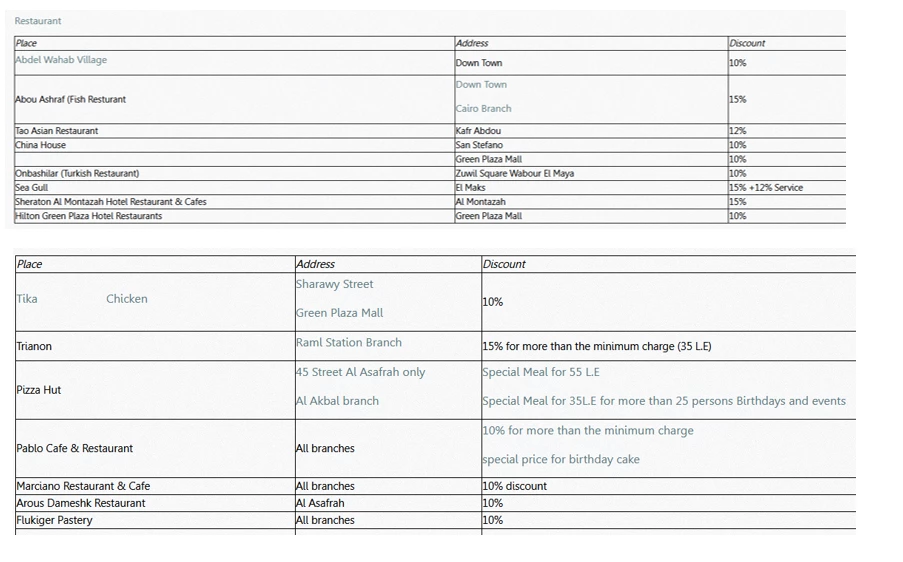 Goal 2. Zero Hunger
Goal 2. Zero Hunger
2.3.5 Staff hunger interventions
Explore PDF
2023-2024
AASTMT demonstrates strong commitment to staff food security through comprehensive programs addressing nutrition, affordability, inclusivity, and community engagement. Initiatives include discounted meals, diverse menu options, dietary accommodations and community dining, and alignment with sustainability and wellness goals, advancing SDG 2: Zero Hunger while supporting dignified employment and institutional excellence. This is done through multiple efforts:
Discounted Meals & Cafeteria Services
The Academy partners with campus and local dining facilities to offer tiered meal discounts (5–30%), ensuring affordable access for all staff. For instance, “Espresso Fellows” offers special 15% discount cards for staff members on campus to get their daily breakfast, snacks and coffee at a lower price. Also, local sourcing supports regional producers and sustainability, minimizing environmental impact. Dining facilities serve ~900 staff daily with balanced macronutrient and micronutrient meals across extended hours.

Food Safety & Quality Assurance
AASTMT enforces strict hygiene, sanitation, and food safety protocols, including staff training, separate preparation areas, and regular audits. Feedback mechanisms ensure consistent quality, nutritional standards, and program affordability.
Health & Productivity Benefits
Access to nutritious meals reduces diet-related disease risk, supports immune function, energy, and improves staff performance, and mental well-being. Staff free from hunger stress demonstrate higher productivity, lower absenteeism, and better professional performance, generating institutional return on investment.
Partnerships with dinners
Collaborations with multiple dining partners promote variety, service quality, and offer discounts to staff members inside and outside the campuses as well. Multiple discounts from restaurants across Egypt are offered to staff members upon providing their employability proof, such as Abdel Wahab Grills, Pablo Café and Restaurants, Pizza Hut, and others.
Partnerships with Dinners on AASTMT webpage
2022-2023
AASTMT prioritizes the well-being of its staff by implementing interventions to prevent or alleviate hunger and promote food security within the institution. These efforts are aligned with AASTMT’s commitment to fostering an inclusive and supportive work environment.
Provision of Nutritious and Affordable Meals:
1. Discounted Meals: AASTMT has established partnerships with campus dining facilities and local restaurants to provide discounts ranging from 5% to 30% on meals for staff. This initiative reduces the financial burden on employees while ensuring access to affordable and nutritious food.


AASTMT's Espresso Fellows Cafeteria: A Catalyst for Improved Food Security and SDG 2
Enhancing Food Accessibility and Quality
The Espresso Fellows Cafeteria at AASTMT represents a significant step towards improving food security and quality within the campus community. By offering a divers menu of high-quality food and beverages at discounted prices, the cafeteria plays a crucial role in promoting the well-being of students and staff.
Impact on Food Security (SDG 2):
Improved Nutritional Intake:
-
Diverse Menu: The cafeteria's varied menu provides access to a range of nutritious food options, including fresh fruits, vegetables, and whole grains.
-
Healthy Choices: By offering healthy alternatives, the cafeteria encourages students and staff to make informed dietary choices, contributing to improved overall health and well-being.
-
Reduced Food Insecurity: Affordable Pricing: Discounted prices make it easier for students and staff to afford nutritious meals, reducing the risk of food insecurity.
-
Convenient Access: The cafeteria's convenient location on campus ensures easy access to quality food, eliminating the need for off-campus dining.
-
Sustainable Food Practices:
-
Local Sourcing: By sourcing ingredients from local suppliers, the cafeteria supports local economies and reduces the environmental impact of food transportation.
-
Waste Reduction: Implementing effective waste management practices, such as composting and recycling, helps minimize the environmental footprint of the cafeteria.
Potential Challenges and Considerations:
To ensure the long-term success of the Espresso Fellows Cafeteria, it is essential to address potential challenges and implement effective strategies:
-
Maintaining Food Quality and Safety:
-
Rigorous Hygiene Standards: Adhering to strict hygiene and sanitation practices is crucial to prevent foodborne illnesses.
-
Regular Inspections: Regular inspections and audits should be conducted to maintain high standards of food safety and quality.
Financial Sustainability:
-
Efficient Operations: Implementing efficient operations, such as inventory management and cost control, can help optimize resource utilization.
-
Innovative Partnerships: Collaborating with local suppliers and businesses can lead to cost savings and unique offerings.
By addressing these challenges and continuing to prioritize food quality, affordability, and sustainability, the Espresso Fellows Cafeteria can serve as a model for campus food services, contributing to the overall well-being of the AASTMT community and the broader goals of SDG 2: Zero Hunger.
2. Nutritional Diversity: Dining facilities on campus offer a range of meal options catering to diverse dietary needs, including vegetarian, vegan, and gluten-free choices. This ensures that all staff can access meals that align with their dietary preferences and health requirements.
3. Shared Dining Experiences: Community dining events allow staff members to participate in meal preparation and share meals together. These gatherings not only address immediate food needs but also promote well-being and strengthen relationships among employees.
Fostering a Health-Conscious Environment
AASTMT ensures that its interventions are inclusive, addressing the nutritional and financial needs of its staff while promoting sustainability and responsible consumption practices. By prioritizing access to healthy and affordable meals, the academy creates a supportive environment where staff can thrive professionally and personally.




